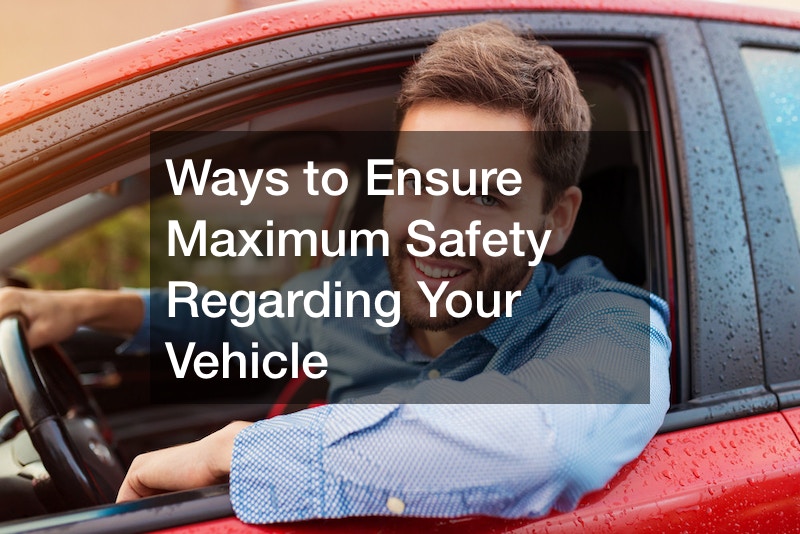
Ways to Ensure Maximum Safety Regarding Your Vehicle

In today’s modernized world, vehicles are not just instruments to get us to certain places; they’re part of who we are. Whether yours is part of a collection or the only mode of transportation you swear by, your vehicle is likely a key part of your daily routine. Ensuring maximum safety is, therefore, paramount. You will be pleased to know that you can look after your vehicle using several practical and effective measures to achieve this. Let’s look at some of them.
1. Discuss if Your Vehicle Needs to Be Sold in Your Divorce
One nasty but unavoidable topic of discussion surrounding divorces is the division of assets, and sadly, your vehicle might come up in this talk. You risk losing it to your partner or selling it to split finances during a split. Either way, knowing how much sentimental value a vehicle may have, you may not be willing to let yours go.
This necessitates a discussion between you and your parting spouse on the possibility that you could retain it. First things first, there needs to be an evaluation of how much your vehicle is worth. You’ll also need to know how much the vehicle means to the two of you and who needs it most. If you both need it, you will need an agreement to share custody and use it during scheduled times. Sharing, as expected, might affect your vehicle’s state as you are not assured the other party will accord its maximum safety.
If it should come down to selling, there are factors to consider, such as advertising costs, which will reflect in the split. Engage your high asset divorce lawyer to determine whether letting your vehicle go is the best option or if you can keep it. They will also help prepare selling documents if you have to sell or share custody schedule if it has sentimental value to both parties.
2. Determine if Your Vehicle Has Any Value

Wanting to give maximum safety and attention to your vehicle is understandable. Still, it should only cost you as much as it’s worth. It’s so easy to get caught up in spending on maintenance when it breaks down that you might not notice you’re digging deep into your savings to keep it going. Blindly estimating your vehicle’s worth could leave you with unseen expenses such as outstanding loans.
Likewise, sentimentality may prompt you to want to fight to keep your vehicle and lose many other things in the process. Should your partner sense your desperation to retain your vehicle, they might ask for more than is reasonable to offset. You need to know the proper value of your vehicle to give in and realize when it’s too late that you lost.
Do a wealth management assessment that will place actual value on all your assets, your vehicle included. To do so, determine the vehicle’s current market value based on its make, model, age, mileage, and overall condition. For a comprehensive understanding, consider other expenses tied to your vehicle, such as maintenance costs, insurance premiums, and fuel consumption.
3. Compare the Pricing for Asphalt vs. Concrete for Your Driveway
Your vehicle’s durability also depends on external factors you may need to consider. For example, the material you use on your driveway could preserve or destroy your vehicle’s wheels. Many factors, such as budget availability, aesthetics, durability, and versatility, determine the kind of driveway you install.
However, you might need to add your vehicle’s maximum safety to the list to strike a balance between them all. The most common materials used are Asphalt and concrete, which offer different attributes. For example, asphalt might be more affordable and accessible to install but requires more maintenance. Concrete has more design options and better durability but costs more in initial installation.
If you are considering either, try talking to asphalt paving specialists in your region. From experience, they can tell which will fit your budget for installation and maintenance. They can advise which will preserve your wheel rubber longer and on necessary maintenance services. They also know how elements in your area affect concrete and asphalt and advise you on which to avoid. If your area is prone to frequent free-thaw cycles, these specialists will advise on additional protective measures you can add to your driveway to prevent chipping, which will eventually ruin your wheels.
4. Learn if Concrete is Safer for Your Vehicle Than Other Materials

Weather conditions in your area, the frequency of use, and your budget all contribute to the driveway you decide to install in your home. Aesthetic values and maintenance costs also determine what option you settle for. However, consider this before installing your driveway to prolong your vehicle’s lifespan.
You want a driveway that will provide your truck maximum safety. Concrete driveways are popular in many regions for their firmness and excellent traction and for reducing the risk of skidding or getting stuck. Concrete’s resistance to oil and chemical spills boosts its ability to prevent debris from damaging your vehicle, adding a safety appeal.
However, you’re not limited to concrete, especially when working with a limited budget. Other options exist; all you need to consider is how well they will bear the elements in your region. Asphalt, a strong contender to concrete, is cheap to install and may require less maintenance in areas with less harsh elements. Poor maintenance leads to potholes in asphalt, which could damage your wheels.
Pavers, gravel, and dirt are also known to make driveways. While they offer cheap solutions, they come with unevenness and loose debris. This risks the safety of your car and grants you too many visits to your mechanic. Maintaining them may consume too much of your budget in the long run.
5. Remove Dangerous Trees Near Your Vehicle
Taking care of your vehicle doesn’t end with regular visits to your mechanic; it involves the surroundings, too. You won’t be offering your car the necessary maximum safety, for example, if you leave it at the mercy of the elements. This will not only cause a faster expiry but also cost you in repairs.
Trees are the most common enemy of your vehicle safety. While they’re beautiful and good for our environment, trees can cause costly damage when you leave your vehicle under their branches. While going your car under a tree’s good shade can be tempting, you must realize that some old trees may be decayed inside and could quickly lose their branches, destroying your car.
Strong, undecaying trees are also a danger. Strong winds and storms can easily break them, posing the same risk to your vehicle. Tree disease and weakening in the roots could also trigger a tree or its branches to fall, landing on your praised possession.
While we can’t do away with trees, all the above are pointers you can’t afford to leave unattended. Hiring local tree removal service providers for regular maintenance, inspections, and proactive measures to prevent accidents and costly damages would be best. These experts can help you pick up rotting or diseased trees and remove them before it’s too late. They’ll also help with roots that could grow too far and potentially break your driveway, posing another risk to your vehicle’s wheels.
6. Hire Professionals to Remove Bee Hives In or Near Your Car

You might be wondering what these beautiful honey-making pollinators have to do with your vehicle’s safety. Like other bugs, bees build their nests in places where they’re not wanted. You might park your car in your driveway for a few days only to find them camped in or on it. This damages your car’s exterior and interior, sometimes causing an expensive mess to clear. Their presence can also result in a significant loss in the resale value of your vehicle.
Bees are distracting to drivers. They’ve been known to cause crashes with their buzzing and painful stings, especially for unaware drivers. When disturbed, their aggressiveness can leave you with allergic reactions bad enough to affect your driving, ultimately leading to minor accidents that will scratch your vehicle’s surface.
Trying to chase bees from your compound by yourself might be more futile than letting them be, as this will only provoke their aggression. Luckily, bee hive removal company staff know just how to help. They possess the necessary equipment, experience, and knowledge to eliminate all bees without risking your and your family’s health. You can trust them to eliminate wasps as well.
7. Speak With Professionals About Removing Rodents Near or In Your Vehicle
One can’t begin to discuss the damage that rodents cause around our homes. Rats, mice, porcupines, beavers, and all may seem minor until they cause havoc to your assets, including your vehicle. First, these disease carriers risk your entire family’s health by dragging zoonotic illnesses with them. Accompanying them is a horde of parasites, such as fleas, that would require extermination to get rid of. Rodents also gnaw through stuff, leaving unmendable holes and a list of repair expenses.
These threaten your vehicle’s maximum safety as they quickly chew through wires, sometimes triggering electric malfunctions. A rat infestation will soon attack your vehicle’s upholstery, leaving bare seats that will cost you a limb to replace. When you discover a nest or rodent droppings near your car, speak to a rodent removal service provider. They will help with removal and advise you on measures to take to prevent recurrence.
8. Assess What Types of Repairs May Be Needed for Your Vehicle Before Driving It

Regular check-ups keep your vehicle’s safety top-notch. During such visits, your mechanic can point out issues before they blow out of proportion, helping prevent significant damage to your car. However, those only suffice at some times.
You, too, must check your vehicle occasionally before driving. This way, you can pick unusual occurrences that would otherwise lead to irreparable damage. It would help if you looked for necessary repair needs before you set out, as driving a faulty vehicle could lead to accidents, sometimes resulting in fatalities.
Check for warning lights, worn tires, brake and suspension health, fluid levels, lights and signals, and even unusual engine sounds. While some may appear easy to ignore, doing so increases accident risks and denies your vehicle’s maximum safety. On the other hand, identifying them early will allow you to notify your trusted mechanic before your journey, getting prompt services such as a quick bumper repair or wheel alignment.
9. Ask About Pricing for Tinting Your Windows and Avoiding High Heat
High heat and intense sunlight are uncomfortable and cause damage to your vehicle’s interior environment. Harmful UV rays penetrating through unprotected windows fade your vehicle’s upholstery, crack your dashboard, and damage electronics. Glare, especially during dawn, dusk, or adverse weather conditions, can blind you, adding to the risk of crashing.
You’ll be fine if you install auto glass tinting. This covers your windows, keeping prying eyes away, maintaining a cooling effect within your car’s interior, and, most importantly, saving it from immature wear and tear. Different tinting options are available in the market, and selecting the best may be challenging. Your mechanic will know the best choice for your veihcle/s maximum safety, depending on your car model, the elements you’re exposed to, and the frequency you’re exposed to the sun.
10. Ensure That Your Car’s Carpeting is Free of Mold and Allergens
Your vehicle’s interior is only complete with proper carpeting. Poorly fitted, dirty, moldy car carpeting is unsightly and uncomfortable and may help spread diseases and parasites. Worse still, loosely held carpeting could trigger you into an accident when you get your foot stuck.
A poorly cleaned vehicle carpet harbors dirt and microorganisms, eventually affecting interior air quality. Moldy carpets make your vehicle’s interior unpleasant, lowering its value and making it appear older. They may cause long-term health complications attributed to breathing in allergens.
While cleaning it yourself may seem like an option, you need a professional carpet cleaning contractor to remove mold spores and allergens from your vehicle. A reliable one will have various services such as regular cleaning, deep cleaning, and mold control. They’ll point out what your car needs to retain maximum safety.
While no vehicle resembles another, the tips discussed above will go a long way in boosting maximum safety regarding yours. Remember to work only with reputable experts to avoid worsening bad conditions. Check your local listings for the best mechanics who can point out to those offering safety services.

